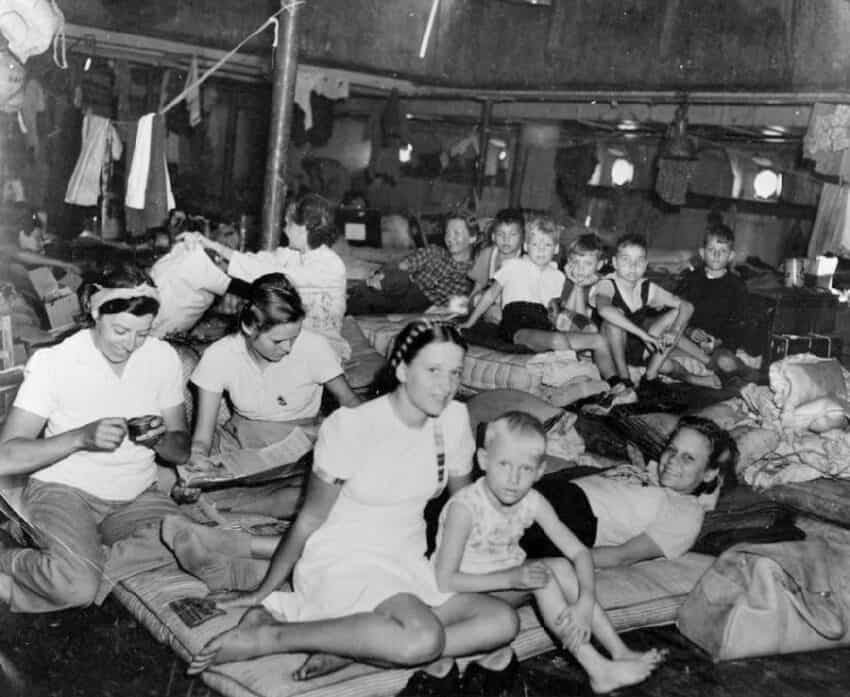By Phil Kohn. Dedicated to the memory of his father, GM3 Walter Kohn, U.S. Navy Armed Guard, USNR, and all men and women who have answered the country’s call in time of need. Phil can be contacted at ww2remembered@yahoo.com.
The last British troops leave the islands of Java and Sumatra in the Netherlands East Indies on November 29, 1946.
A British military court in Rome on November 30 sentences two former German commanders, Col. Gen. Eberhard von Mackensen and Lt. Gen. Kurt Mälzer, to death for the murder of 335 Italian civilians in the Ardeatine Caves outside of Rome in 1944. The civilian massacre was carried out in retaliation for the death of 32 German soldiers in a bomb attack by Italian partisans. In May 1947, the sentences of both Mackensen and Mälzer are reduced — to 21 years and life in prison, respectively.
On December 1, Miguel Alemán Valdés replaces Miguel Avila Camacho as President of Mexico. Alemán is the country’s first civilian chief executive since 1920, following a string of military rulers. He is also the first of a new generation of Mexican leaders who did not participate in the Mexican Revolution (1910-1920).
The U.S. and the U.K. on December 2 agree to merge their German occupation zones — to be known as the Bizone — effective 1 January 1947. The French will add their occupation zone on 1 August 1948 (the region will be called the Trizone). On 23 May 1949, the Trizone will become the Federal Republic of Germany, commonly referred to as West Germany.
The U.S. government on December 3 asks the UN to order Francisco Franco, the head of state, out of Spain. President Truman is particularly opposed to the Spanish leader, characterizing him as an evil dictator comparable to Hitler and Mussolini.
In the U.S., a federal judge on December 4 finds the United Mine Workers union and its president, John L. Lewis, guilty of contempt of court for continuing the nationwide coal miners’ strike. Lewis is fined $10,000 personally, while the union is assessed a $3.5-million penalty.
On December 5, President Harry Truman issues Executive Order 9808 that creates the President’s Committee on Civil Rights. The body is charged with developing suggestions for improving civil rights in the United States.
In London, a conference on India hosted by Prime Minister Clement Attlee collapses on December 6 when Muslim League leader Mohammed Ali Jinnah announces that Muslims will refuse to participate in the upcoming Indian Constituent Assembly. In Yugoslavia, the National Assembly votes to nationalize 42 industries.
The 17-day strike by 400,000 U.S. coal miners ends on December 7 as John L. Lewis, president of the United Mine Workers union, in the face of large penalties to himself and the union, orders all striking miners back to work.
At Muroc Army Air Field in Edwards, California, the Bell XS-1 rocket plane makes its first powered flight on December 8. with test pilot Chalmers Goodlin at the controls. Less than a year later, the aircraft, then called the X-1 and flown by test pilot Chuck Yeager, will become the first airplane to break the sound barrier, at a maximum speed of 807.2 miles per hour.
On December 9, 209 delegates open the Constituent Assembly for India in New Delhi. The Muslim League’s 76 delegates boycott the session.
Iranian government troops invade secessionist Azerbaijan province, in the northern part of the country, on December 10. (In November 1945, the Soviet Union had helped set up the Azerbaijan People’s Government there, prior to its troops leaving Iran.)
Much activity occurs on December 11. Ja’far Pishevari, the leader of the Azerbaijan People’s Government, in Iran’s Azerbaijan province, orders his troops to surrender to Iranian government forces. Pishevari departs Tabriz, the provincial capital, for the Soviet Union. The UN General Assembly votes to create the United Nations International Children’s Emergency Fund (UNICEF). In New York City, John D. Rockefeller, Jr., offers to buy six city blocks of land along the East River in Manhattan for $8,500,000 and donate it to the UN for its permanent headquarters. The Trust Territory of Tanganyika, in East Africa, is created by the United Nations, to be administered by the United Kingdom. In the U.K., inventors Freddie Williams and Tom Kilburn apply for a patent for their Williams-Kilburn cathode-ray tube, an early form of computer memory. The first random-access, digital-storage device, the tube will be used successfully in several early high-speed computers, including Manchester (England) University’s Mark I machine. Spain is barred from the UN so long as Francisco Franco remains in power. (In 1950, the UN General Assembly — with the support of many Western countries who feel that Spain’s anti-communist government would be an asset to the “free world” in the Cold War — revokes the ban on Spain, which joins the UN as a full member in 1955. Francisco Franco remains Spain’s Head of State until his death in 1975.)
A report from Dresden in the Soviet occupation zone of Germany on December 12 says that police now forbid the use of the word “jawohl” (which means “yes, certainly”) as sounding “too Nazi.” Only “ja” (meaning “yes”) will be allowed. In the U.S., Procter and Gamble introduces “Tide” laundry detergent. A United Nations committee votes to accept a six-block tract of Manhattan real estate offered as a gift by John D. Rockefeller, Jr., to be used as the permanent site of UN headquarters.








